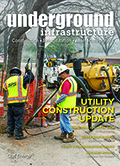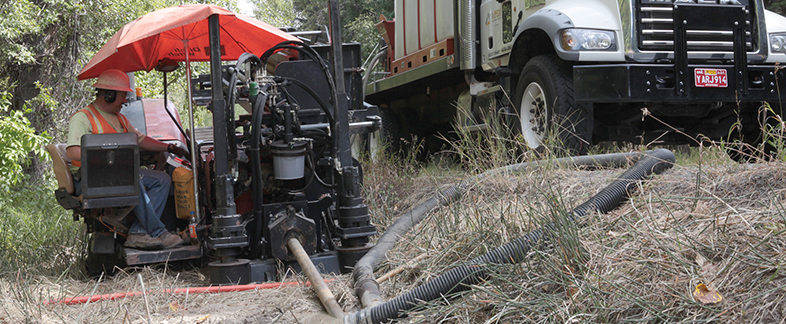March 2016, Vol. 71, No. 3
Features
Complexities Of Modern HDD Make Directional Drilling Rig Maintenance Even More Important

No one disputes the importance of proper directional drilling rig maintenance, yet too often it is neglected. The consequences ultimately show up on the bottom line and whether a project is profitable or one that goes in the red. Properly maintaining HDD equipment simple is good business.
Multiple cost factors affect every HDD installation such as whether it will make or lose money, and contractors have little or no control over many of them.
The directional drilling business is changing rapidly, said Richard Levings, American Augers, director of product management
“Margins, rising transportation costs, availability of labor, equipment investment, compliance with environmental issues and requirements all are driving the need for different ways to ensure profitability,” said Levings. “Job sites now must be kept free of drilling fluids and potholing is required in many cities and states and that means one or perhaps two more pieces of equipment are needed. Fluid disposal is becoming more difficult and costly. Insurance rates are rising. HDD is being required in more job situations, but increasing costs are not offset by prices paid for the work.”
Making your time count
Levings said as directional drilling has become more complex, the amount of time taken to actually drill the pilot hole and pullback product has decreased.
“The time it takes to make a bore nowadays,” said Levings, “is less than 50 percent of the total time to complete a job with more time needed for planning, locating utilities and potholing, site clean and restoration. It’s more important than ever to avoid downtime. If equipment problems stop work on a job and a deadline is going to be missed, there are six other guys ready to step in and take over.”
Drillers today have to be more efficient, and preventive maintenance is a factor in the equation that a HDD contractor can control.
It isn’t surprising to find that many HDD contractors have aggressive maintenance programs.
“Preventive maintenance is one of the easier, least costly ways to reduce the risk of downtime,” believes Levings. “Equipment owners are becoming more progressive, keeping wear parts on hand and paying attention to equipment care.”
Regular maintenance schedules may vary by make and model, but every machine’s manual lists points out require maintenance schedules and the intervals when they should be performed. Successful directional drilling contractors make preventive maintenance a top priority and have two basic options for implementing it: self-performed maintenance or maintenance provided by an equipment dealership.
“As the HDD industry has matured,” said Levings, “there is a greater number of contractors operating multiple rigs and fewer small companies with only a few units.”
Larger contractors are in a better position to do self-maintenance. “Big contractors may have their own shop and repair and maintenance staff,” said Levings. “If equipment is working in a metropolitan area and machines are left on the job overnight, maintenance can be performed by night crews. Or they may have service trucks that can perform maintenance and some repairs on site.”
Support
Smaller contractors usually have more limited resources to self-maintain, complicated by the pressures of pressing completion dates. If machines are working every day, it may seem “impossible” to take time off for routine maintenance so required maintenance is postponed or never performed.
Therefore, small contractors tend to depend on equipment dealers not only to provide parts, but make all but minor repairs. Dealerships have fully-equipped shops and trained mechanics and technicians, and many operate mobile service trucks.
Parts availability is a critical element in maintaining equipment, and it’s not surprising that manufacturers and dealers advocate using “genuine” brand parts.
HDD equipment is highly specialized, and their emphasis is that the OEM parts are made to specifications for their equipment and will perform better, last longer and provide the buyer assurance of quality.
Even so, a variety of will-fit consumables such as drill pipe, drill bits, backreamers, other non-OEM downhole tools, lubricants, pump parts, track pads and other parts are widely available and routinely used.
Vermeer Service Technician Randy Dake said a well-maintained directional drill runs longer, functions more efficiently and is more productive when it is running at its full potential. “Good things happen when a regular maintenance schedule is followed,” said Dake. “Bad things happen when it isn’t.”
Dake said Vermeer directional drills come with maintenance schedules outlined in the maintenance manuals, detailing which services should be performed daily, and which ones should be performed at 50-, 100-, 150-, 250-, 500- and 1,000-hour intervals
“Vermeer recommends that contractors do general maintenance like greasing, checking fluids and performing walk-arounds at the end of each day,” Dake said. “It provides an opportunity to clean the machine’s components and be confident the machine will work efficiently when you return to the job site the next day.
“By checking regular maintenance points at the end of the day, the inspector still is in the mindset of the job. If a part needs to be replaced, it can be picked up or the machine taken to the dealership.
“When a machine needs attention, address it right away. Little things can turn into big things in a hurry. It’s best to address problems right away.”
Responsibility
Dake said it is good to make a crew member responsible for preventive maintenance on the job site. That individual should check fluids and grease and inspect the machine daily according to the procedures in the maintenance manual. For deeper service work, it is best to take machines to the manufacturer’s authorized dealership.
“The global Vermeer dealer network,” Dake said, “has technicians on staff that are offered training by Vermeer’s dedicated service personnel. We instruct dealership service technicians how to inspect equipment, what to look for and how to service the machine in the most efficient manner. If a dealership does not have a needed part in stock, the dealer can order it from the manufacturer’s parts distribution center and receive it promptly – typically within 24 to 48 hours.”
Dake added that Vermeer recommends using original equipment manufactured parts designed specifically for Vermeer machines to help keep equipment working as designed and stand up to job-site challenges.
Ditch Witch Global Accounts Manager Gary Lawson said following a regular maintenance program maximizes the user’s uptime and reduces downtime by replacing components at specific intervals before they wear out or break.
“Performing regular maintenance,” Lawson added, “also helps equipment owners know the true cost of each piece of equipment, which helps with bidding jobs where the equipment is utilized.”
Lawson said the benefits of a self-maintenance programs, when followed regularly, are those just outlined.
“However,” he continued, “the issue with self-maintenance programs is that contractors and other owners don’t have the time or discipline to keep up with the maintenance program. For this reason, maintenance performed by dealers can be beneficial to customers by keeping maintenance routines on schedule.”
Having dealers service equipment offers several benefits, Lawson said.
“Specific to Ditch Witch,” he continued, “our dealers have the advantage of Ditch Witch training and regular communication and updates from the factory. Equipment updates and training are recurring on a regular basis to make sure all dealers have the latest information and are familiar with any enhancements and new technologies and features.”
Genuine Ditch Witch parts are made to work on specific pieces of equipment and are designed to the proper specifications of each unit, Lawson said.
“Will-fit parts, on the other hand, are not made for a specific unit and are designed to fit a wider range of unit specifications,” he pointed out. “The downside to this is quality. While will-fit parts may be less expensive up front, they don’t last as long as genuine parts and usually require replacement sooner. In the short term, customers save money with will-fit parts, but over time, genuine factory parts provide greater ROI.”
FOR MORE INFORMATION:
American Augers
(800) 324-4930, www.americanaugers.com
Vermeer Corp.
(888) 837-6337, www.vermeer.com
Ditch Witch
(800) 654-6481, www.ditchwitch.com






Comments